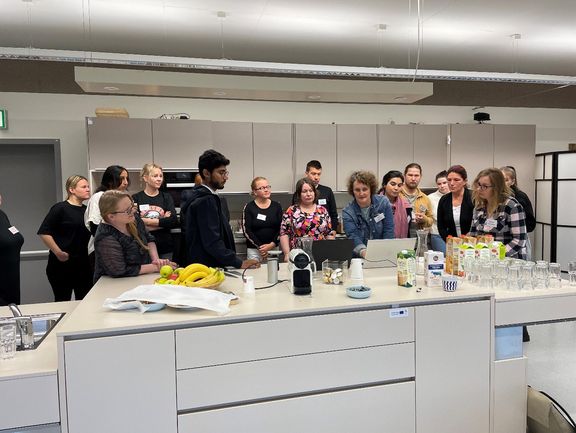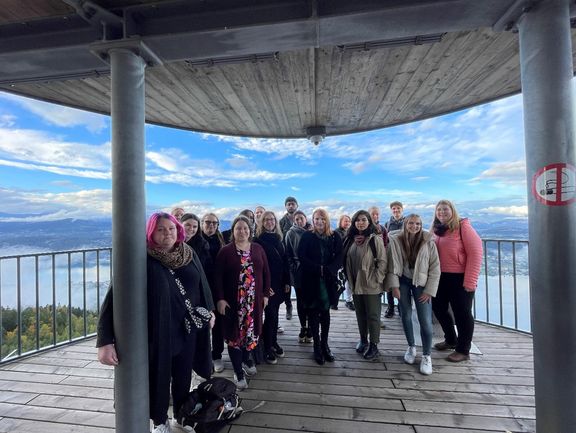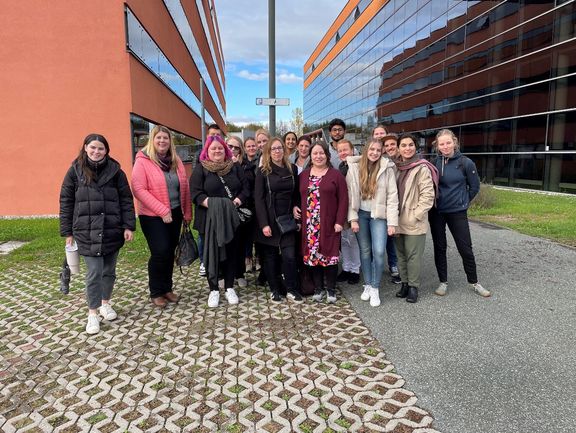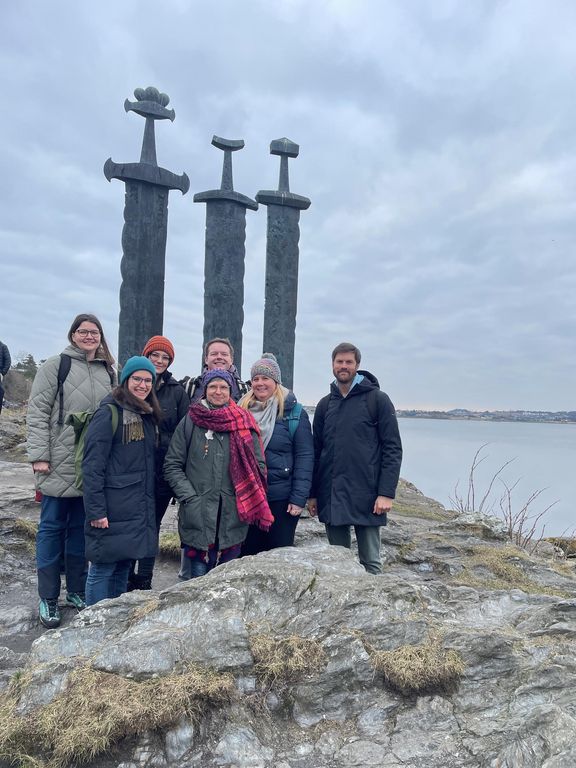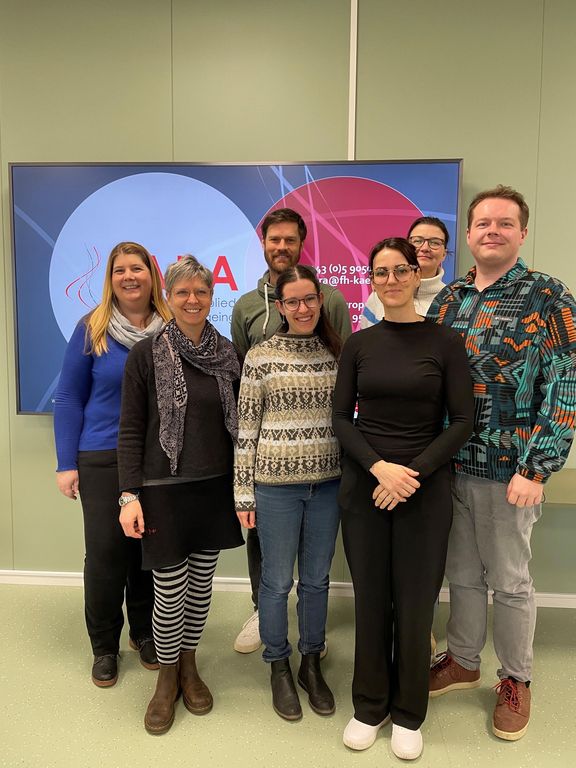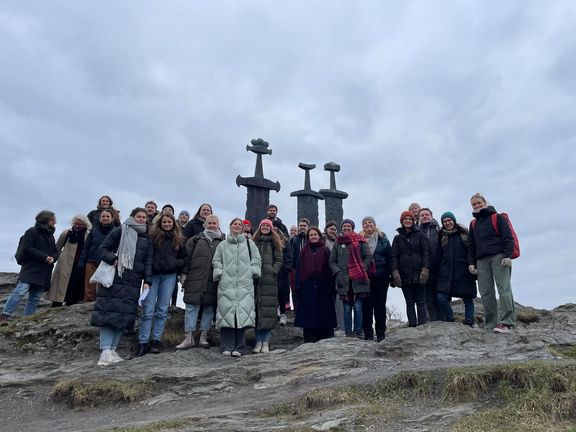Blended Intensive Programs
Blended Intensive Programme (BIP) is a term introduced with the new Erasmus Plus program. It refers to projects in teaching between at least three higher education institutions from three different Erasmus countries, in which short physical mobility is complemented by a mandatory virtual component.
Blended Intensive Programs offer teachers and learners new and creative opportunities for international educational collaboration and participation in jointly designed courses.
Links to different BIP platforms:
If you are interested in participating in a BIP organised at the Carinthia University of Applied Sciences, please send a nomination to k.davidde[at]fh-kaernten[dot]at or international[at]fh-kaernten[dot]at via the responsible International Office with the following student information:
- First name
- Surname
- Gender
- Date of birth
- Place of birth
- Nationality
- Telephone number
- E-mail address
Blended Intensive Programs at the CUAS ...
... for students
Partners:
University of Ljubljana (Slovenia), University of Ghent (Belgium), Linnaeus University (Sweden), WSB University(Poland).
Location:
Villach
Focus:
Facets of social change
Description:
The Blended Intensive Program, with its focus on facets of societal change, enables international student teams to work on societally relevant focus topics in an organizational context. The focus changes each year and ranges from gender & youth to inclusion & diversity to sustainability. The goal is for students to acquire a broad range of skills and develop an understanding of the impact of societal trends on the corporate and organizational landscape and thus on our future working world.
Contact:
Claudia Morocutti, c.morocutti[at]fh-kaernten[dot]at
Link Video:
https://www.youtube.com/watch?v=G7avqrQlzoU
Partners:
University of Ljubljana (Slovenia), Universitat Autonoma de Barcelona (Spain)
Location:
Villach
Focus:
Sustainable Entrepreneurship
Description:
Around 50 students from FACHHOCHSCHULE KÄRNTEN and from all over the Alps-Adriatic region as well as from Barcelona enjoyed the fantastic opportunity to collaborate across languages and cultures at Makerspace Carinthia. Nine teams developed business ideas embedded in sustainability and the SDGs. This cross-border Alps-Adriatic project contributed to a global, conscious and sustainable community (#GCSC) of entrepreneurial thinkers and leaders and has been supported so far by trainers from FACHHOCHSCHULE KÄRNTEN, Turismo y Dirección Hotelera UAB, Global Case Study Challenge, Slovenian and Carinthian startup scene, including Iris E., Daniela Planinschetz-Riepl, Dr. Johann Schabauer, Gerald Mueller, Philippa Hell-Höflinger and Gloria Bottaro.
Contact:
Eithne Knappitsch, e.knappitsch[at]fh-kaernten[dot]at
Partners:
Karelia University of Applied Sciences (Finland), Technische Universität Darmstadt (Germany)
Location:
Klagenfurt
Focus:
Digital transformation, inclusion/diversity
Description: study material:
The aim of the BIP is for students to work internationally in inter- and transdisciplinary teams on the one hand and to acquire multi-professional perspectives on the other. The thematic framework for this is provided by the content of the BIP, which is about critically reflecting on diversity in the digitalized world in order to discuss, in a further step, the challenges and opportunities that can contribute to the (re)creation of social justice through digitalization. Phenomenon-oriented learning enables students to get to the bottom of a phenomenon and stimulate a group process. The goal is to develop a vision of how social justice can be achieved through digitalization, based on the students' personal knowledge interest. The aim is to combine the students' own experiential knowledge with scientific findings and thus achieve a critical level of reflection. The BIP teachers see themselves as mentors who accompany the students' learning process, provide expert input, make connections and offer the framework so that group processes can develop. The goal of the on-site intensive week is to give students the opportunity to work in an international environment after the online exchange, to get to know each other personally, and to deepen their group vision. Experimentation with different technological systems stimulates phenomena-based (experiential) learning. At the same time, students' communication skills and intercultural competencies are trained and strengthened.
Contact person:
Christine Pichler, C.Pichler[at]fh-kaernten[dot]at
Link:
t.b.d.
Partners:
University of Ljubljana (Slovenia), Universitat Autonoma de Barcelona (Spain), Escola FUABformació (Spain), Università degli Studi di Udine (Italy), ATHENA European University
Location:
Klagenfurt
Focus:
Sustainable Entrepreneurship
Description:
Teams of students from FACHHOCHSCHULE KÄRNTEN and from all over the Alps-Adriatic region as well as from Barcelona will develop business ideas embedding sustainability and the SDGs. This cross-border collaboration does not only contribute to the entrepreneurial mindset of the students, it also strengthens their consciousness about sustainability and helps them develop intercultural and language skills.
Contact:
Eithne Knappitsch, e.knappitsch[at]fh-kaernten[dot]at
Partner:
Università degli Studi die Udine (Italy), University of South-Eastern Norway (Norway)
Location:
Klagenfurt
Focus:
Evidence-Based Practice
Description:
We offer a unique opportunity to participate in the Erasmus+ Blended Intensive Programme (BIP) and learn from experts from different countries. The Programme consists of online workshops and collaborative teamwork with an intensive week in Klagenfurt, Austria. The main topics covered during the program are: Fundamentals of evidence-based practice (EBP), Principles and key competences of EBP, Application of EBP in Practice, and Statistical basis for EBP through literature search and evaluation as well as interprofessional collaboration and communication.
Contact at CUAS:
Ulrike Tscherne U.Tscherne[at]fh-kaernten[dot]at
Partner:
Universitat Autonoma de Barcelona (Spain) , Università degli Studi die Udine (Italy), Kauno technikos kolegija (Lithuania), Hellenic Mediterranean University (Greece)
Location:
Klagenfurt
Focus:
Sustainable Entrepreneurship and Entrepreneurial Mindset Development
Description:
The program aims to provide participants with a comprehensive understanding of sustainable entrepreneurship.
Entrepreneurship often involves working in teams, and the program aims to enhance participants' ability to work effectively together, share ideas, and leverage collective strengths.
Participants will attend online sessions and have remote team buildings before the onsite part of the program.
The program emphasizes the importance of generating innovative and sustainable business ideas.
Participants will learn how to develop and refine business models and they will gain insights into sustainable business practices.
The program focuses on the practical aspect of entrepreneurship by introducing participants to prototyping and design thinking methodologies
Entrepreneurship involves inherent risks and challenges. The program aims to address participants' fear of failure by providing a dedicated workshop to explore this topic
Pitch training and preparation sessions are included to equip participants with effective communication and presentation skills
Last but not least, at the end of the program participants will acquire a sustainable and entrepreneurial mindset while gaining a bundle of essential skills to thrive in their personal life and professional career.
Sustainable entrepreneurship intertwines environmental and social concerns with business, promoting ventures that balance profit with planet preservation and social welfare. As we confront pressing issues like climate change, resource exhaustion, demographic shifts and biodiversity loss, businesses adopting social and sustainable practices can actively counter these threats with eco-friendly operations, renewable energy solutions, and socially-oriented and sustainable offerings. Today's consumers favor businesses demonstrating sustainability commitments, aligning with their own values. By practicing sustainable entrepreneurship, businesses can build trust, enhance brand reputation, and attract a growing segment of environmentally conscious consumers.
Contact
at CUAS: Eithne Knappitsch e.Knappitsch[at]fh-kaernten[dot]at
Partner:
Universidad CEU San Pablo (Spain), Medical University of Gdańsk (Poland), KARELIA University of Applied Sciences (Finland), University of Orléans (France), University of Porto (Portugal)
Location:
Klagenfurt
Focus:
The primary objective of the BIP is to foster a collaborative understanding of applied telemedicine in a physiotherapeutic context across Europe. The content of the BIP serves as the thematic framework for this, with a focus on implementing digital tools throughout the therapeutic process, starting with diagnostics, continuing with monitoring in outdoor settings and concluding with summarizing the therapeutic process. The objectives of this BIP are to gain an understanding of how to use different digital tools throughout the therapeutic process, how patients can be supported with digital tools, to develop an appreciation of the limitations of digital tools, the interpretation of data, and to gain insight into the shift in the role of a physiotherapist in an online setting. Problem-based learning facilitates collaborative learning among students, enabling them to identify the most effective solution to develop a deeper understanding of telemedicine in the physiotherapeutic context and to identify potential applications. The BIP teachers act as mentors, guiding the students through the learning process. They provide professional input, establish connections and create a framework for group processes to develop. The on-site Intensive Week provides students with the opportunity to discuss similarities, risks and benefits of therapeutic measurements between virtual and presence therapy. Additionally, it offers the chance to gain experience of working in an international setting after the online exchange. It also provides an opportunity to get to know each other in person, to establish an European network and to deepen their group visions. Experimentation with various technological systems stimulates problem-based (experiential) learning. Furthermore, the communication skills and intercultural competencies of the students are developed and enhanced.
Description:
The primary objective of the BIP is to collaborate with other students from European institutions to identify strategies for incorporating digital tools to assist patients undergoing physiotherapy. This would facilitate the delivery of superior-quality care within their own homes and facilitate the transition towards more active and healthier lifestyles for those who require it.
The following elements and methods are employed during the BIP:
- Asynchronous elements in online weeks: lectures, essential readings, videos, individual work, group work, group vision processes
- Synchronous elements: The programme commences with a kick-off workshop and intensive week in Carinthia/Austria, during which participants engage in workshops, experimentation and presentations.
- Problem-based learning
The following outcomes are to be achieved during the BIP:
Students…
- will improve their communication skills
- are aware of the potential risks and benefits associated with therapeutic treatment in both physical and virtual environments.
- are able to link suitable technologies to their treatment approaches
- will use sensor-based data for monitoring purposes and biofeedback
- will grasp the basic social and ethical implications of these technologies
- will name and describe relevant development processes and definitions in the area of telemedicine.
- Development, implementation and evaluation of telemedicine measures, taking into account legal, technical and profession-specific framework conditions based on application examples.
- Implementation of telemedicine in physiotherapeutic process with practical examples.
Contact:
Michael Suppanz, m.suppanz[at]fh-kaernten[dot]at
... for staff
Partner:
Hellenic Mediterranean University, University of Orléans, University of Vigo, Polytechnic University of Santarém
Location:
Villach
Focus:
This BIP focuses on research supervisors and HEI managers aiming to build knowledge about existing support structures for postgraduate students and provide and expand research supervision skills in a structured manner.
Description:
The staff program aims to enhance participants' understanding of recent trends in doctoral studies and strengthen their competencies in research supervision, while also providing a platform for exchange and discussion.
In the online portion, the program will explore diverse experiences from postgraduate schools across Europe, transnational support structures established by European universities, and innovative formats of postgraduate studies that prioritize societal impact over traditional academic models. Participants will engage in discussions on the challenges of building these frameworks and assess their effectiveness.
With increasing pressures on both students and supervisors, mental health has become a critical factor influencing the success or failure of doctoral studies. During the in-person component of the BIP, participants will address these concerns, working with a well-being researcher and practitioner to learn stress-relief techniques they can apply both personally and recommend to their students.
Furthermore, participants will have a unique opportunity to enhance their pedagogical and supervision skills. A full-day event organized by the Didactic Center of Carinthia University of Applied Sciences will allow participants to delve into the latest trends and best practices in higher education pedagogy. The program will conclude with an intensive two-day seminar led by a renowned Danish expert. Its goal is to enhance participants' supervisory skills by expanding their repertoire of tools and strategies, making research supervision a more professional, effective, and rewarding experience. Delivered in an engaging, interactive format, the workshop combines group work, hands-on exercises, plenary discussions, and lectures.
Contact
at CUAS: Julia Marinaccio J.Marinaccio@fh-kaernten.at
Blended Intensive Programs, ...
... in which the Carinthia University of Applied Sciences has sent students and staff
Partners:
Diaconia University of Applied Sciences (Finland), University of Applied Sciences Würzburg-Schweinfurt (Germany), VID Specialized University (Norway), University of Tartu (Estonia), University College Cork (Ireland)
Location:
Helsinki
Focus:
Eco-social change
Description:
The course provided a foundation for understanding the concepts and debates underlying the key issue of Eco social change: How can populations achieve sustainable lives within the limits that the Earth's ecosystems can support by implementing social and economic policies that lead to a more just and equitable society?
Students explored the key themes of this question, the relationship between society and the environment through key concepts such as green growth vs. degrowth, sustainable development, climate change and health, demographic change, digitization, sustainable health care and well-being, social inequality, and intergenerational equity.
Students also learned to apply these concepts to analyze key factors for transforming society through eco-social policies.
Contact person at CUAS:
Andrea Stitzel, A.Stitzel[at]fh-kaernten[dot]at
Link:
https://www.diak.fi/en/studying/international/intensive-programmes/eco-social-change/
Partners:
Diaconia University of Applied Sciences (Finland), University of Applied Sciences Würzburg-Schweinfurt (Germany), VID Specialist University (Norway).
Location:
Helsinki
Focus:
Digitization in the context of different healthcare professions
Description:
In BIP Digital Competences 2022, international students from different health professions came together and worked on digitized solutions. Already in the online program that took place in advance, the groups came together and were able to work together on different topics (e.g. digitalization in general, universal design, etc.) through teambuilding activities and exercises and to get to know the different perspectives of the health professions. On site, the team structure was strengthened by the hackathon that was held and the groups competed against each other in a competitive hackathon. In addition to further theoretical input, the main focus was to support the students and develop a concept. At the end of the hackathon, there were pitches and a winning group was chosen by a jury. Apart from the teaching and learning activities, teambuilding was also not neglected on site, with a visit to the cinema and an Amazing Race through Helsinki organized by the on-site partner university Diakonia.
Contact person at CUAS:
Andrea Stitzel, A.Stitzel[at]fh-kaernten[dot]at
Link:
Short video:
Partners:
University of Ljubljana (Slovenia), University of Gent (Belgium)
Location:
Ljubljana
Focus:
Inclusion and diversity
Description:
The Blended Intensive program focuses on inclusion and diversity, viewed from the students' perspective. International students come together in Ljubljana to collaboratively understand the impact of diversity and discrimination and develop a comparative mindset around the capacity for inclusion. Students will gain an understanding of the inclusion process and awareness in higher education. Additionally, practical presentation and debating skills will be developed as part of the BIP.
Contact person at CUAS:
Claudia Morocutti, c.morocutti[at]fh-kaernten[dot]at
Link:
https://www.fu.uni-lj.si/en/international-relations/bip/
Partners:
Diaconia University of Applied Sciences (Finland), University of Applied Sciences Würzburg-Schweinfurt (Germany), VID Specialist University (Norway).
Location:
Helsinki
Focus:
eHealth in an interdisciplinary context
Description: study material:
In BIP Digital Competences 2023, international students from different health professions, and this year newly also students with a background in medical informatics, come together and jointly develop digitized solutions, e.g. to support vulnerable groups. Already in the online program that takes place in advance, the groups get together and can work together in teambuilding activities and exercises on different topics (e.g. digital accessibility, artificial intelligence, etc.) and get to know the different fields of education. On site, the team structure is strengthened by the hackathon that is held and the groups compete against each other in a competitive hackathon. In addition to further theoretical input, the main goal is to support the students and develop a concept of a digitalized solution. At the end of the hackathon, there are pitches and a winning group is chosen by a jury.
Contact person at CUAS:
Daniela Ströckl,D.Stroeckl[at]fh-kaernten[dot]at
Link:
Partner:
University of South-Eastern Norway Campus Drammen (Norwegen), Università degli studi di Udnie (Italien)
Location:
Udine
Focus:
Stroke world between professions and cultures: getting to know, be interested and exchange to care
Description: study material:
Das Blended Intenisive Programme wird genutzt, um den Austausch von bewährten Praktiken und evidenzbasierten Ansätzen in der Schlaganfallversorgung zu fördern. Digitale Werkzeuge werden genutzt, um Erfahrungen zwischen Erasmus-Partnern auszutauschen. Das Projekt hat spezifische Ziele wie die Identifizierung der wichtigsten Strategien für die Schlaganfallversorgung, den Austausch von Informationen über die Epidemiologie von zerebrovaskulären Erkrankungen und das Untersuchen des Managements der Schlaganfallversorgung in den beteiligten Ländern. Die Analyse der klinischen Instrumente und der Teamansatz in der Akutphase eines Schlaganfalls werden in der Präsenzphase durchgeführt, während die Erfahrungen von Fachkräften und Nicht-Gesundheitsberufen in verschiedenen Versorgungskontexten hauptsächlich in der Online-Phase untersucht werden.
Contact person at CUAS:
Sabine Spanz, S.Spanz@fh-kaernten.at
Link:
t.b.d.
Partner:
Diaconia University of Applied Sciences, Technical University of Applied Sciences Würzburg-Schweinfurt (Germany), VID Specialized University (Norway), Carinthia University of Applied Sciences (Austria) and University College Cork (Ireland)
Location:
Helsinki
Focus:
- Intersections between health care, social services and sustainability
- Connections between human health and the political, economic, and social systems
- Transdisciplinary framework of planetary health
Description:
The BIP is designed for students interested in exploring the intersections between health care, social services and sustainability. The course will enable the students to examine and show the connections between human health and the political, economic, and social systems, as well as the natural systems of our planet through the transdisciplinary framework of planetary health.
Contact person at CUAS:
Andrea Stitzel
Link:
Planetary Health – Diaconia University of Applied Sciences (diak.fi)
Partners:
VID Specialized University (Norway), Diaconia University of Apllied Sciences, DIAK (Finland), Protestant University of Applied Sciences (Bochum, Germany), Carinthia University of Applied Sciences (Austria)
Location:
Oslo
Focus:
Human rights and reflection on issues of diversity, participation, discrimination, disability, abelism and more
Description:
The course is based on an overarching, bio-psycho-social view of persons. What each citizen can do, what societal roles they can play and the quality of life that each citizen can experience are influenced by complex interplay between the person and their surroundings. Co-operation between public and private services and how society is shaped are of fundamental importance to the individual citizen’s room for maneuverability. This is what is referred to in the CRPD as an understand of disability as inter-action.
Contact person at CUAS:
Christine Pichler C.Pichler[at]fh-kaernten[dot]at
Link:
Erasmus+ Blended Intensive Programs hos VID - VID vitenskapelige høgskole
Partners:
University of Ghent (Belgium), University of Ljubljana (Slovenia), Linnaeus University (Sweden), WSB University (Poland), the Carinthia University of Applied Sciences
Location:
Ghent
Focus:
Sustainability and Sustainable Development Goals
Description:
The BIP "Sustainable Development Goals (SDGs) – Gain SDG-knowledge and become an expert in your chosen SDG" represents an opportunity to embark on an inspiring international journey, cultivating a profound understanding of global sustainability challenges and possible solutions. The program offers a dynamic blend of knowledge sharing, hands-on experience, and cross-cultural immersion. Speakers from diverse backgrounds in government, industry, and academia, from different geographical regions, will share their insights, shedding light on the diverse sustainability issues of our time which are set out in the SDGs. Students have the opportunity to collaborate with peers from other higher education institutions from different European countries, engaging in real-world projects that tackle sustainability challenges. Also, participants can take part in excursions and social activities in the city of Ghent and its surrounding.
Contact person at CUAS:
Verena Fink V.Fink[at]fh-kaernten[dot]at
Link:
Partners:
Trakia University (Bulgarien), Fachhochschule Kärnten (Österreich) und Hochschule für angewandte Wissenschaften Neu-Ulm (Deutschland)
Location:
Neu-Ulm
Focus:
Entrepreneurship in the healthcare sector
Description:
The Startup Camp One Health offers a great opportunity to immerse yourself in the topic, learn more about how to start a business and exchange ideas with international students and lecturers. You will be part of a great team from day one. Through interactive elements and team challenges, you can actively contribute to innovative ideas and acquire valuable skills for your future business endeavours.
Contact person at CUAS:
Klaus Wettl K.Wettl[at]fh-kaernten[dot]at
Link:
https://www.hnu.de/internationales/erasmus/bip-startup-camp-one-health
Partners:
University of León (Spain), Šiauliai State University of Applied Sciences (Lithuania)
Location: Porto, Portugal
Location:
Porto, Portugal
Focus:
Information and Communication Management
Description:
The objectives for the program participants are:
- to understand the importance of information and comunication management as a structural element in the overall management of organizations in the digital era
- to reflect on the areas of action of the infocommunication manager
- to prepare for future work skills: group interaction and work with a high technological component, practice of a foreign language (english), relationships that require cultural sensitivity, and group work in an international context.
